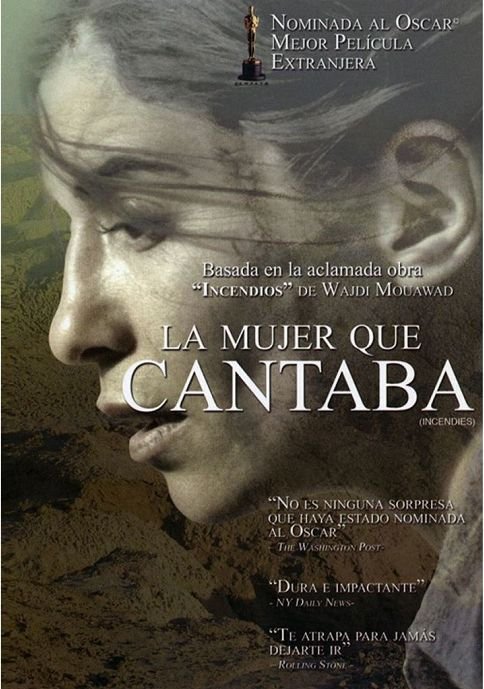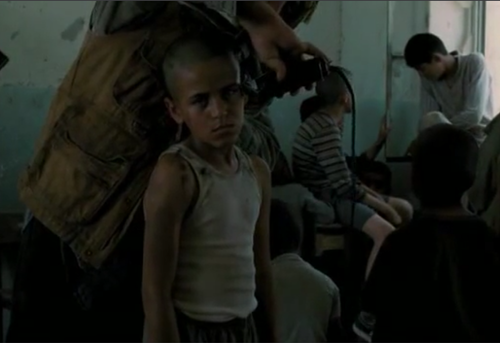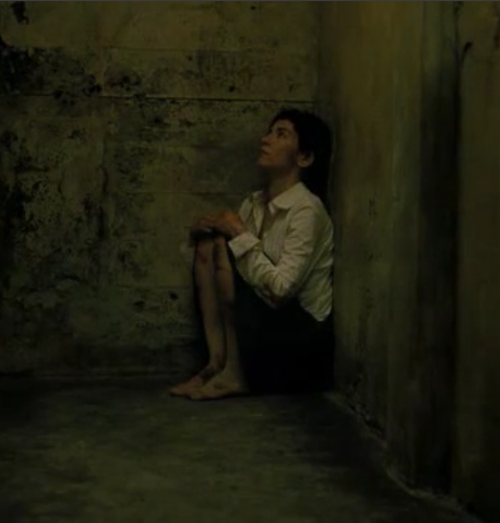

The Woman Who Sang is a very tough film, which contains extremely strong elements, without falling into the morbid and graphic representation of the ongoing violence of Hollywood movies. It is a love story, with many elements that make it complex and that in fact will clash with the moral standards of some people.
Researching about the movie, I was able to discover that it is part of a tetralogy of plays, called "The Blood of Promises" by a Lebanese writer named Wajdi Mouawad, who arrived and lived as a refugee with his family in Canada.
I had to look for information about the film, since to a certain extent I was shocked by the type of film making, the strength of some of the dialogues and the treatment of the dialogues and the scenography, which at some moments caused me some kind of shock. However, when I did some research on the film, I understood it, since the film is the result of the adaptation of the second play of Mouawad's tetralogy, which is called "Incendio".
The film begins with a first scene, where a group of armed famines are cutting the hair of some children, who are fearful, beaten and some with blood and tears on their faces, is a scene without sound, which for some does not say much, but for others says more than words can define, and lasts about a minute.

From there, we move on to what could be the second act of the play, where two young men are sitting at a notary's table, receiving their mother's will. There, they receive the news that their father is alive and that they have a brother.
On the other hand, the last will of the mother, who is "The woman who sang", is to be buried naked, face down, in a grave without a tombstone, until her last will is fulfilled, and only after having fulfilled it, her children will be able to put a tombstone on their mother's grave.
From that moment on, the two twin brothers, a man and a woman, have a confrontation about the last will of their mother, which ends with the sister's decision to go to Lebanon to look for her father and brother, to fulfill the last will of their mother, which will lead her and her brother to learn the true story of their mother and all that she lived.
In their search, they will find elements and situations unknown to them that will change their lives completely, at the moment they discover the true story of their mother, "The woman who sang", loved, respected and admired by many, and at the same time hated and rejected by others.

In the film we will find situations that will clash with our western culture, such as honor killings, the forced separation of a mother and her baby, violence and religious hatred, the insanity of war, prison and repression of political activists, exile as a way out of the hell lived, the vision of the traumas of war in a family, and a heartbreaking ending that may affect morally more than one viewer.
However, the film gives a glimpse of situations that were very real and that have been expressed in many other books and films on the subject of the war in Lebanon in the 1970s.
I do not think it is an easy film for some people, but it is still an excellent film, so for the unsuspecting viewer who is not interested in cinema, beyond the playful and visual aspects, it may not be the right film. However, for the assiduous viewer, awake and who likes cinema, he/she will find it interesting.
Finally, "The Woman Who Sang" is not an easy film, it is very raw, but without being visually grotesque, as I said, as a spectator, in some moments one expects more, however, it is achieved with cuts, which at times feel strange, a situation that is explained by knowing that it is an adaptation of a play.

It is a film that may strike, in a very intimate spiritual, moral and emotional way, some sensitive people, but it is a film worth seeing. Finally, remember that although it is a Canadian film, it is a film that touches on cultural elements from other regions with very different worldviews from those of the West, and we must be clear about this in order to understand the complex message given by the author of the work, Wajdi Mouawad, who, in my opinion, was very, very traumatized by the experiences of war and religious hatred in his country of origin.
I leave you this link where you can see the film in Spanish
All the photos that are placed in the post, are screen captures that I made of some scenes of the movie.
I hope that those who can see it, enjoy it and leave your comments, because the film has a lot of cultural, moral, historical and religious aspects, which if it is true that they are not touched in depth, give for a wide discussion.
Thanks for reading.



La mujer que cantaba. Una película que nos muestra la rudeza y la crueldad de la guerra de una manera diferente.
La mujer que cantaba, es una película muy dura, que contiene elementos sumamente fuertes, sin caer en el morbo y la representación gráfica de la violencia continúa de las películas hollywoodienses. Es una historia de amor, con muchos elementos que la van haciendo compleja y que de hecho chocará con los patrones morales de algunas personas.
Investigando sobre la película, pude descubrir que es parte de una tetralogía de obras de teatro, llamada “La sangre de las promesas” de un escritor libanés de nombre Wajdi Mouawad, que llegó y vivió como refugiado junto con su familia en Canadá.
Tuve que buscar información sobre la película, ya que hasta cierto punto me impactó el tipo de realización de la película, la fuerza de algunos diálogos y el trato de los mismos y la escenografía, que en algunos momentos me causaron cierto tipo de choque. Sin embargo, al investigar sobre la película, lo entendí, dado que la misma, es el resultado de la adaptación de la segunda obra de teatro de la tetralogía de Mouawad, que tiene como nombre “Incendio”.
La película comienza con una primera escena, donde un grupo de hambres armados, le están cortando el pelo a unos niños, los cuales están temerosos, golpeados y algunos con sangre y lágrimas sobre sus rostros, es una escena, sin sonido, que para algunos no dice mucho, pero que para otros dice más de los las palabras puede definir, y dura cerca de un minuto.

De ahí, pasamos a lo que podría ser el segundo acto de la obra de teatro, donde dos jóvenes están sentados en la mesa de un notario, recibiendo el testamento de su madre. Ahí, ellos reciben la noticia de que su padre está vivo y de que tienen un hermano.
Por otro lado, la última voluntad de la madre, que es “La mujer que cantaba”, es ser enterrada desnuda, boca abajo, en una tumba sin lápida, hasta que se cumpla su última voluntad, y únicamente después de haber cumplido con la misma, sus hijos podrán poner una lápida en la tumba de su madre.
A partir de ese momento, los dos hermanos mellizos, un hombre y una mujer, tienen un enfrentamiento sobre la última voluntad de su madre, que termina, con la decisión de la hermana, de ir al Líbano a buscar a su padre y a su hermano, para cumplir con la última voluntad de su madre, lo que la llevará a ella y su hermano, a enterarse de la verdadera historia de su madre y de todo lo que vivió.
En ese camino de búsqueda, se encontrarán con elementos y situaciones para ellos desconocidos que le cambiarán la vida por completo, en el momento que roncen la verdadera historia de su madre, “La mujer que cantaba”, amada, respetada y admirada por muchos, y a la vez odiada y rechazada por otros.

En la película encontraremos, situaciones que van a chocar con nuestra cultura occidental, como lo son, el asesinato por honor, la separación forzosa de una madre y su bebé, la violencia y el odio religioso, la demencia de la guerra, la cárcel y la represión a los activistas políticos, el exilio, como opción de salida del infierno vivido, la visión de los traumas de la guerra en una familia, y un final desgarrador que puede que afecte moralmente a más de un espectador.
Sin embargo, la película, deja entrever situaciones, que fueron muy reales y que han sido expresadas en otros tantos libros y películas sobre el tema de la guerra del Líbano en los años 70.
No creo que sea una película fácil para algunas personas, pero no deja de ser una excelente película, por eso, para el espectador desprevenido y que no le interese el cine, más allá de los aspectos lúdicos y visuales, tal vez no sea la película adecuada. Sin embargo, para el espectador asiduo, despierto y que le guste el cine, la considerará interesante.
Finalmente, “La mujer que cantaba” no es una película fácil, es muy cruda, pero sin ser grotesca visualmente, como comenté uno como espectador, en algunos momentos espera más, sin embargo, se consigue con cortes, que en momento se sienten extraños, situación que se explica al saber que es una adaptación de una obra de teatro.

Es una película que tal vez golpee, de manera muy íntima en lo espiritual, lo moral y lo emocional, a algunas personas sensibles, pero es una película que vale la pena ver. Finalmente, recordar que aunque es una película canadiense, es una película que toca elementos culturales de otras regiones con visiones del mundo muy diferentes a las occidentales y tenemos que tener esto bien en claro, para poder entender el mensaje tan complejo que nos da el autor de la obra, Wajdi Mouawad, que para mi criterio, quedó muy pero muy traumatizado, por las experiencias de la guerra y el odio religioso en su país de origen.
Les dejo este enlace donde podrán ver la película en español.
Todas las fotos que se colocan en el post, son captures de pantalla que realicé de algunas escenas de la película.
Espero que los que la puedan ver lo hagan, la disfruten y dejen sus comentarios, ya que la película, tiene una cantidad de aspectos, culturales, morales, históricos y religiosos, que si es cierto no son tocados a fondo, dan para una amplia discusión.
Gracias por leerme.


La veré apenas tenga un tiempo, gracias por la recomendación.
Te aseguro que te va a gustar.
¡Felicidades! Esta publicación obtuvo upvote y fue compartido por @la-colmena, un proyecto de Curación Manual para la comunidad hispana de Hive que cuenta con el respaldo de @curie.
Si te gusta el trabajo que hacemos, te invitamos a darle tu voto a este comentario y a votar como testigo por Curie.
Si quieres saber más sobre nuestro proyecto, acompáñanos en Discord: La Colmena.
The rewards earned on this comment will go directly to the people(@osomar357) sharing the post on Twitter as long as they are registered with @poshtoken. Sign up at https://hiveposh.com.
It's seems a very emotional and hard movie to digest! You need to be strong to watch this type of movie! Thanks for the review
!1UP
Hi, thanks for the comment, and yes, it really is a strong movie, but worth watching.
Happy day
oh and a !PIZZA and !hivebits
Success! You mined .9 HBIT & the user you replied to received .1 HBIT on your behalf. mine | wallet | market | tools | discord | community | <>< daily
PIZZA Holders sent $PIZZA tips in this post's comments:
@gwajnberg(4/15) tipped @osomar357 (x1)
Learn more at https://hive.pizza.
You have received a 1UP from @gwajnberg!
@cine-curator, @pimp-curator, @vyb-curator, @pob-curator, @cent-curator
And they will bring !PIZZA 🍕, !PGM 🎮 and !LOLZ 🤣
Learn more about our delegation service to earn daily rewards. Join the Cartel on Discord.